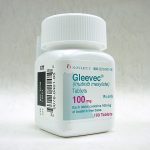What To Avoid When Taking Gleevec (imatinib mesylate)

For most people, taking a new medication may mean switching up your lifestyle a bit and that includes the foods you eat. A food-drug interaction means that a specific nutrient or compound within the food changes the way your body metabolizes the medication, and this can either enhance or reduce the dose your body gets, according to Johns Hopkins Medicine. The potential results: an increased risk of side effects, many of which can be dangerous, or the drug not working as it was intended. Before introducing a medication, ask your pharmacist about any food and drug interactions, including with alcohol, and any adjustments you may have to make to your diet.
What is Gleevec?
Gleevec (imatinib mesylate) is a kinase inhibitor that inhibits a protein signal that causes cancer cell proliferation used to treat patients with hematological malignancies or malignant sarcomas such as Philadelphia positive chronic myeloid leukemia, chronic myeloid leukemia in blast crisis, acute lymphoblastic leukemia, aggressive systemic mastocytosis, gastrointestinal stromal tumors, and other diseases.
Gleevec (imatinib mesylate) inhibits the bcr-abl tyrosine kinase, the constitutive abnormal tyrosine kinase created by the Philadelphia chromosome abnormality in chronic myeloid leukemia (CML).
This medication was initially approved for use by the U.S. Food and Drug Administration (FDA) in 2001 for the treatment of chronic myelogenous leukemia (CML), a rare form of cancer that affects certain types of white blood cells. Since its initial approval, Gleevec has also been approved for use in patients with several types of gastrointestinal tumors. Currently, scientists continue to study the drug’s effectiveness not only in various cancers but also in other diseases, such as stroke.
How to use Gleevec
Take this medication by mouth with a meal and a full glass of water (8 ounces/240 milliliters) as directed by your doctor, usually once or twice daily. Do not crush the tablets. If you have trouble swallowing the tablets whole, you may dissolve the tablets in a glass of water or apple juice. The amount of liquid will depend on your dose. Consult your doctor or pharmacist for more detailed instructions. Stir the mixture well until the tablet(s) dissolve, and drink right away.
The dosage is based on your medical condition, response to treatment, and other medications you may be taking. Be sure to tell your doctor and pharmacist about all the products you use (including prescription drugs, nonprescription drugs, and herbal products). For children, the dosage is also based on their body size.
Do not increase your dose or use this drug more often or for longer than prescribed. Your condition will not improve any faster, and your risk of side effects will increase.
Since this drug can be absorbed through the skin and lungs and may harm an unborn baby, women who are pregnant or who may become pregnant should not handle this medication or breathe the dust from the tablets.
What To Avoid When Taking Gleevec (imatinib mesylate)
You should avoid the following foods and drugs while taking Taking Gleevec (imatinib mesylate):
- Grapefruit or drinking grapefruit juice
- CYP3A4 inducers (examples include dexamethasone, phenytoin, carbamazepine, rifampicin, phenobarbital, fosphenytoin, primidone or st. John’s wort)
- During Gleevec (imatinib mesylate) treatment, doctors recommend that you limit the dose of paracetamol at 1300 mg per day.
Using them with Gleevec (imatinib mesylate) affects the way the medication works by decreasing exposure to imatinib and increasing the risk of treatment failure. In addition, concurrent usage also increases the risk of unwanted side effects.
What are the side effects of Gleevec?
Common side effects of Gleevec include:
• nausea,
• stomach pain or upset,
• vomiting,
• diarrhea,
• gas,
• headache
• muscle or joint pain,
• muscle cramps,
• feeling tired,
• dizziness,
• blurred vision,
• drowsiness,
• skin rash,
• flu-like symptoms,
• stuffy nose, or
• sinus pain.
Tell your doctor if you have serious side effects of Gleevec including:
• severe blistering skin rashes,
• yellowing skin and eyes (jaundice),
• gastrointestinal bleeding,
• weakness with shortness of breath,
• severe headaches,
• swelling,
• severe flu-like symptoms
• easy bruising or bleeding,
• fast or pounding heartbeat,
• extreme tiredness,
• sudden or unexplained weight gain,
• swelling (especially of lower legs/the area around eyes),
• black or bloody stools,
• dark urine, or
• vomit that looks like coffee grounds.
Gleevec may cause other side effects. Call your doctor if you have any unusual problems while taking this medication.
If you experience a serious side effect, you or your doctor may send a report to the Food and Drug Administration’s (FDA) MedWatch Adverse Event Reporting program online (http://www.fda.gov/Safety/MedWatch) or by phone (1-800-332-1088).





